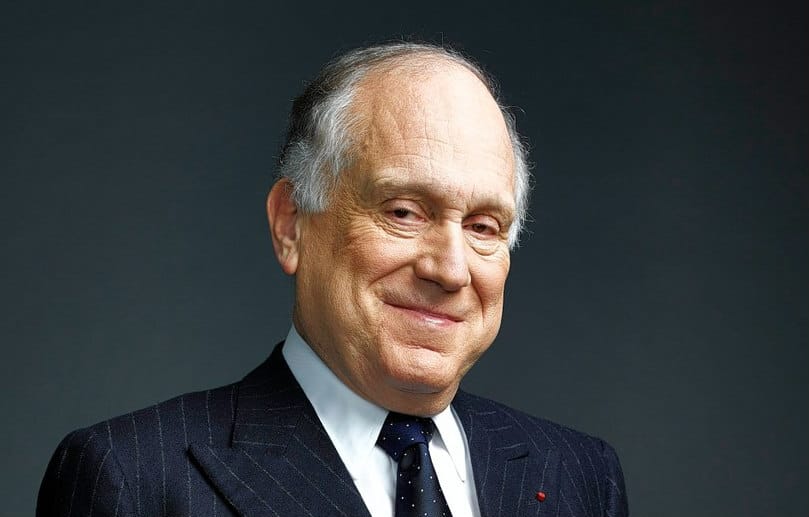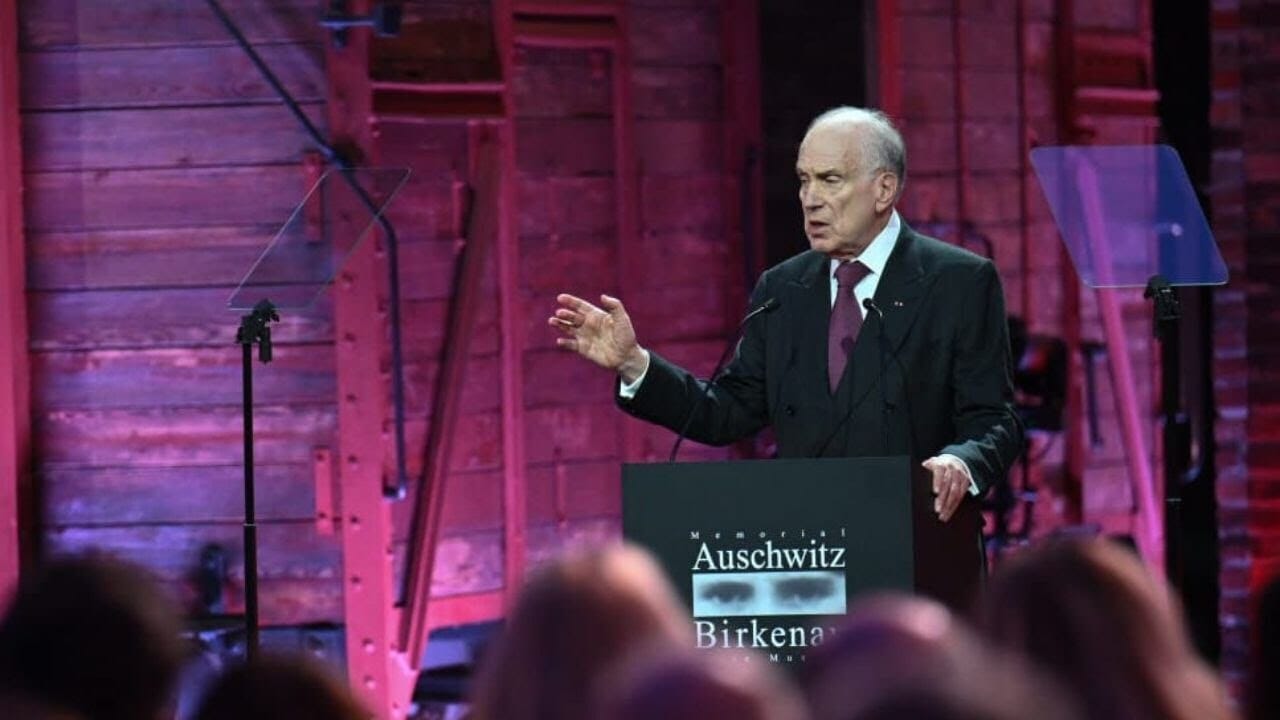- The Weekly Mensch
- Posts
- The Weekly Mensch: Ronald Lauder
The Weekly Mensch: Ronald Lauder
Where influence meets identity: a legacy of leadership and remembrance
Us in a Nutshell
We are passionate about the lives, the impact, and the experience of Jewish baby boomers who have changed our world. From finance to the arts, we write about the stories of contemporary heroes who — significantly and meaningfully — changed the face of their respective industries, often starting with nothing but a legacy of exile. We tell their stories for the timeless lessons of intelligence, ethics, and resilience they underline. And we also share some fun anecdotes! Nathan Tob is a fourth-year student at the Queen Mary University of London. He studies Economics, Finance, and Management. Davy Sokolski is a third-year student at Columbia University in New York. He studies International Political Economy.
What is a Mensch?
Leo Rosten defines mensch as “someone to admire and emulate, someone of noble character.” Dr. Saul Levine writes in Psychology Today that a mensch’s personality characteristics include decency, wisdom, kindness, honesty, trustworthiness, respect, benevolence, compassion, and altruism.
Ronald’s Rapid Bio

Ronald Steven Lauder, born on February 26, 1944, in New York City, is a businessman, diplomat, philanthropist, and one of the most prominent Jewish leaders of the 21st century. The younger son of Estée and Joseph Lauder—the founders of the Estée Lauder cosmetics empire—Ronald, was raised with a strong sense of heritage, entrepreneurial spirit, and responsibility to give back. He attended the Bronx High School of Science, earned his undergraduate degree from the Wharton School of the University of Pennsylvania, and continued his studies at the University of Paris and the Hebrew University of Jerusalem.
Lauder began his career in the family business, helping Estée Lauder expand into the European market. But his interests soon moved beyond commerce. In 1983, he entered public service under President Ronald Reagan, serving as U.S. Deputy Assistant Secretary of Defense for European and NATO Policy. In 1986, he was appointed U.S. Ambassador to Austria. His time in Vienna deeply impacted him—he was shocked by how little remained of the once-vibrant Jewish communities decimated by the Holocaust. This realization would shape the rest of his life.
In 1987, Lauder founded the Ronald S. Lauder Foundation, dedicated to rebuilding Jewish life in Central and Eastern Europe. From Prague to Budapest, the foundation has funded schools, camps, synagogues, community centers, and leadership development initiatives. His work has helped revive Jewish identity for a generation that had been disconnected from its roots under communism.
Lauder has served as President of the World Jewish Congress since 2007, where he has been a leading global advocate for Jewish unity, the fight against antisemitism, and the defense of Israel. He has addressed the United Nations, advised heads of state, and taken bold stands against threats to Jewish life around the world. At the same time, Lauder has worked to foster interfaith dialogue and Holocaust remembrance, playing a key role in the preservation of Auschwitz-Birkenau and supporting education initiatives like March of the Living.
A passionate art collector and philanthropist, Lauder is also the founder and chairman of the Neue Galerie in New York City, which focuses on German and Austrian art, including Gustav Klimt’s famous “Portrait of Adele Bloch-Bauer I.” He has contributed to medical research, supported the Israel Defense Forces, and championed Jewish education through organizations like Birthright Israel and the Lauder School of Government at IDC Herzliya (now Reichman University).
Ronald Lauder’s life is a testament to how business, diplomacy, and purpose can intersect. From boardrooms to embassies to synagogues in post-Soviet Europe, he has made it his mission to ensure that Jewish life not only survives but thrives. For Lauder, legacy isn’t only about success—it’s about responsibility, identity, and the courage to rebuild what was nearly lost.
Ronald’s Life Lessons
1. Lead by creating, not competing
Ronald Lauder didn’t just grow a cosmetics empire—he fundamentally reframed how legacy brands could innovate from within. When Estée Lauder reached a growth ceiling in the late 1960s, rather than overextend the flagship brand, Lauder made a counterintuitive move: he created its competitor. Clinique wasn’t just a new product line; it was a strategic disruption. Designed with dermatologist input, fragrance-free, and targeted to consumers with sensitive skin, it responded to an unmet need in the marketplace. Lauder reflected, “If I wanted to compete with Estée Lauder, what would I do? That became Clinique.” The launch not only opened a new revenue stream but redefined beauty marketing by positioning health and science at the core of luxury.
Trailblazing leaders don’t just win market share—they redraw the market map. Innovation is not iteration; it’s reinvention. Through constant self-questioning and quest for improvement, Lauder redefined not only his market but his industry.
2. Authenticity builds lasting value
Long before authenticity became a buzzword, Ronald Lauder built it into the DNA of his business strategy. At a time when flash advertising dominated the beauty industry, Lauder doubled down on substance: quality products and personal trust. He believed brand loyalty should be earned—not manufactured. His approach was tactile, literal: offer generous samples, let the product prove its worth, and earn a customer for life. “If you give a customer a sample of a product and they like it, they'll come back again and again. That’s what builds the business,” he explained. But Lauder’s authenticity extended beyond marketing. He refused to sell through drugstores, maintaining prestige by protecting brand placement and consumer experience. He understood that perceived value is built not only on what you sell—but where and how you sell it.
Trust, not tactics, is the ultimate competitive advantage. Lauder’s approach underscores that authentic value and integrity are fundamental to building enduring businesses. Companies that prioritize genuine customer relationships rooted in trust and quality are the ones that stand the test of time.
3. Heritage is a responsibility, and education the only solution
To Ronald Lauder, heritage is not about nostalgia—it’s about accountability. His life’s work reflects a commitment to remembering the past not as a burden, but as a moral compass for the future. As founder of the Neue Galerie, Lauder reclaimed and preserved early 20th-century Austrian and German art, including Gustav Klimt’s iconic “Portrait of Adele Bloch-Bauer I,” stolen by the Nazis and later repatriated through Lauder’s effort and philanthropy. Equally, his role in preserving Auschwitz-Birkenau is not symbolic—it is strategic. “What if I had been born in Budapest in 1944?” he once asked, walking through the gates of Auschwitz. His efforts have ensured that future generations will not just read history—they will stand where it happened, feel its weight, and understand its warning. In parallel, Lauder has long championed education as the most potent tool against ignorance and intolerance. Observing rising antisemitism among younger generations influenced by social media misinformation, Lauder emphasized that "serious, honest education is the only way to correct this." He has personally invested decades and substantial resources into Jewish education and cultural preservation across Europe, establishing schools, community centers, and supporting educational initiatives globally.
Heritage is not passive remembrance—it is a proactive pledge. To preserve is to protect, to educate, and to resist forgetting. Memory, curated with integrity, becomes society’s immune system against indifference. By investing in authentic, informed education, we empower future generations to understand, empathize, and prevent history’s worst tragedies from repeating themselves.
The Quote of The Week
“You are only as successful as the people who work for you want you to be”

Reply